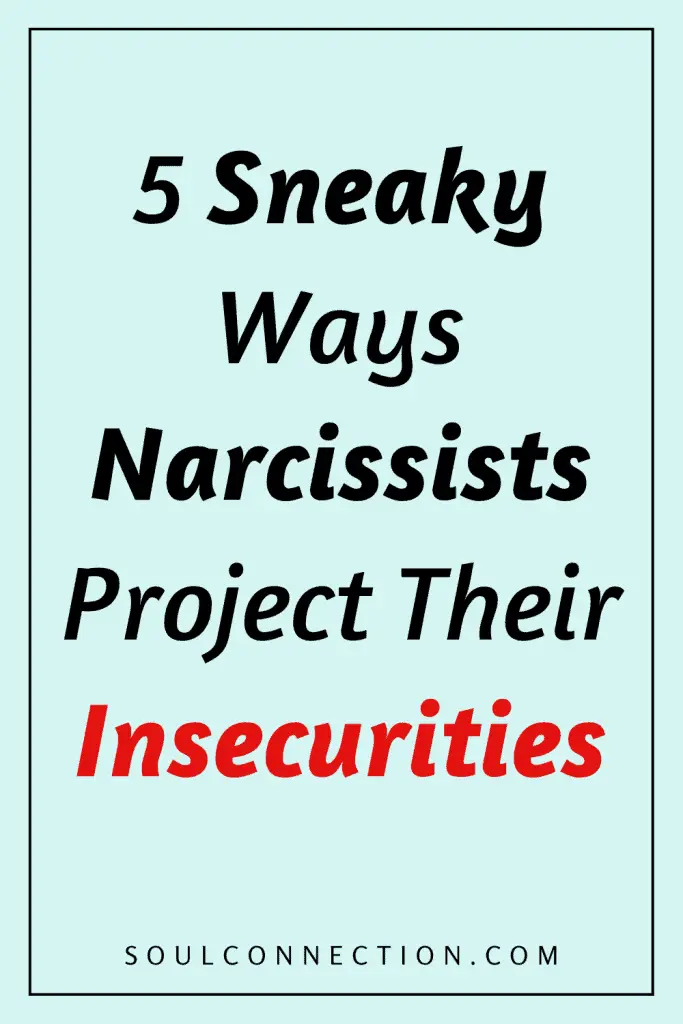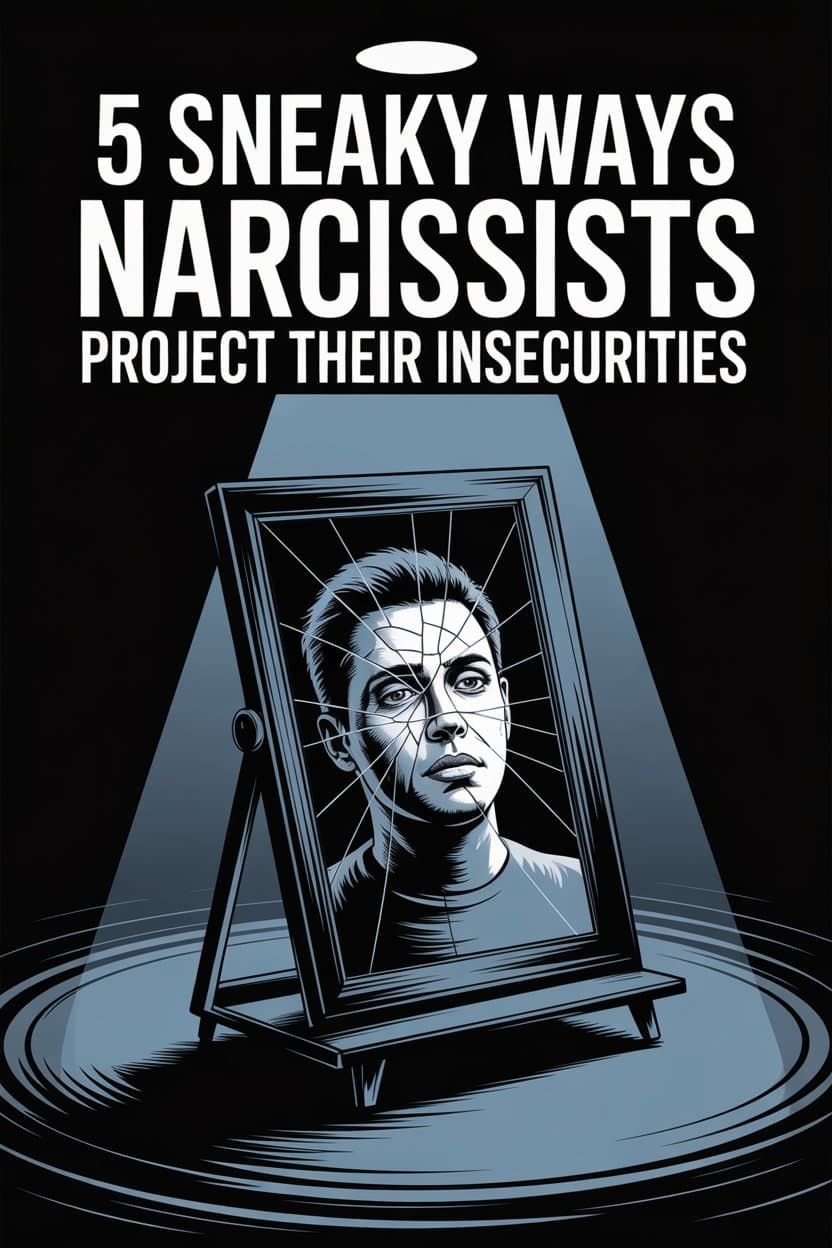Ever tried arguing with a narcissist and ended up feeling like you’ve just lost a debate you never signed up for? Welcome to the circus of projection, where the narcissist is both the ringleader and the star performer.
If your partner, boss, or that “friend” who always makes brunch about them seems to operate from a script only they understand, you’re probably wondering what on earth is actually going on.
Spoiler: It’s not you. It’s them. And their sneaky habit of tossing their own insecurities under your doormat then blaming you for tripping over them.
Curious what these moves look like in real life, or just want to check for secret narcissists in your group chat? Here are five classics (or should we say hits?) of narcissistic projection.
1. Accusing You of Their Bad Habits
There’s nothing quite as head-spinning as being accused of something you never did—especially by someone who’s practically writing the manual on the behavior in question.
For narcissists, self-reflection is about as appealing as cold soup. So, when they catch a whiff of their own less-than-sparkling behavior, the go-to move is to pin it on someone else. Usually, you.
If your partner is chronically flirting with strangers, suddenly you’re the “untrustworthy” one. Craving a little space? Apparently, you’re “emotionally unavailable” (translation: you didn’t text back within three minutes).
The trick here is subtle: they spot in you what they most fear in themselves, and point fingers faster than you can say “gaslight.”
Not only does this take the pressure off them to change, it also leaves you dizzy, second-guessing every move.
The next time you’re called selfish, rude, or inattentive by someone who ticks all those boxes, remember: you might just be standing in a hall of mirrors, not a relationship.
What helps? Calmly reflect the accusation back: “That’s interesting. Can you give me an example of when I did that?” Usually, specifics are in short supply. Keep your own reality check handy—you’ll need it.
2. Turning Minor Criticism Into a Full-Blown Attack
Ever tried giving a narcissist gentle feedback? Maybe something minor, like “I’d appreciate a little more help with the dishes” or “Could you warn me before inviting the entire rugby team over?” Prepare for DEFCON 1.
Narcissists hear criticism the way a cat hears a vacuum cleaner: instant panic, claws out. The moment they feel even slightly attacked, they’ll project their own deep-seated insecurities right onto you.
Suddenly, you’re the “over-sensitive” one, or worse, the “abusive” partner for daring to mention you can’t survive on takeout anymore.
It’s a classic defense. Instead of absorbing feedback and reflecting (or, you know, just loading the dishwasher), they flip the script. You’re left wondering if you imagined the entire conversation.
What helps? Stick to facts, not feelings, and keep your requests simple. If the conversation turns into an opera about your supposed flaws, gently steer it back or take a breather. Your sanity matters.
3. Playing the Victim to Guilt-Trip You
Ever witnessed someone who can turn forgetting to take out the bins into a Shakespearean tragedy—with themselves as the misunderstood hero? Narcissists have mastered the fine art of victimhood.
When confronted with the effects of their actions, the world suddenly revolves around their suffering.
Suddenly, your need for basic respect is “unreasonable” or “cruel.” They paint themselves as the sacrificial lamb, enduring your impossible standards—while you’re just asking for a text when they’re running late, not the moon on a stick.
It’s more than emotional manipulation; it’s projection at its most melodramatic. The real issue (their inability to take responsibility) is swept under the rug, replaced by a storyline where they’re the ones needing rescue.
And if you don’t rescue them? Cue the guilt parade.
What helps? Don’t buy a ticket to the show. Empathize briefly—“I’m sorry you feel that way”—but stand your ground. Boundaries are your best friend here (and they don’t need rescuing. Promise).
4. Blaming You for Their Emotional Rollercoaster
Ever been told you “make” someone angry, jealous, or anxious? Narcissists are Olympic-level athletes when it comes to dodging responsibility for their own feelings.
If their mood swings are more unpredictable than British weather, you can bet it’ll be your fault.
They stomp around, slam doors, or give you the silent treatment, then insist you’re the reason for their “upset.” Apparently, your mere existence is more triggering than a surprise test after a bank holiday.
All jokes aside, this kind of projection chips away at your self-esteem. If you’re forever apologizing for things you didn’t do, or if you spend more time mind-reading than actually talking, that’s a bright red flag flapping right in your face.
What helps? Remind yourself (and the narcissist, if you’re feeling brave) that everyone’s responsible for their own emotions.
“I’m sorry you’re upset. What do you need right now?” is a diplomatic way to acknowledge their feelings without taking the blame.
5. Attacking Your Character Instead of Owning Up
Let’s say you catch a narcissist in a lie, or (heaven forbid) ask them to apologize. Rather than admit fault, they launch into a character assassination worthy of a soap opera villain.
Suddenly, your honesty is “manipulative,” your desire for clarity is “controlling,” and your patience is “weakness.” It’s not a disagreement; it’s an all-out attack on your very identity.
Projection at its finest: by highlighting (or inventing) flaws in you, they get to ignore their own.
This isn’t just about winning the argument—it’s about rewriting reality so their ego stays blissfully untouched. If their version of events sounds like a plot twist no one saw coming, you’re not alone.
What helps? Don’t take the bait. Stand firm in your values, and refuse to join their game of “whose character is worse.” If things get too heated, step away and remind yourself who you are outside this circus.
When You Spot Projection in Action
Narcissists are crafty, but even the best magicians have tells. Spotting projection is the first step to getting off the emotional merry-go-round.
Here’s the kicker: their insecurities are not yours to carry. You deserve relationships where honesty, accountability, and kindness are more than just background noise.
Boundaries aren’t selfish; they’re essential. And while you can’t force a narcissist to see their own reflection, you can decide what you’re willing to tolerate in your own life.
Next time you find yourself on the receiving end of these sneaky moves, pause, breathe, and remember—sometimes the problem really isn’t you.
Tea, anyone?


